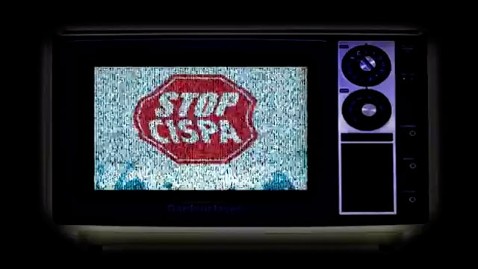Talk Begins of April 22 Online 'Blackout' in CISPA Protest

Image credit: YouTube
No sooner had the House of Representatives passed the Cyber Intelligence Sharing and Protection Act (CISPA), on Thursday, than word began spreading of an online protest. Some are suggesting the protest take the form of a "blackout" - going offline for 24 hours, displaying censorship bars over content or posting statements of opposition to Internet censorship - similar to last year's opposition to the Stop Online Piracy Act (SOPA) and the Protect IP Act (PIPA).
Supporters on Twitter have begun tweeting the hashtag #CISPABlackout to promote the proposed April 22 "blackout."
Call ur favorite websites to #blackout for 24 hours. Let's show the unity and power of the Internet they're trying 2 exploit! #CISPABlackout
— Anonymous (@YourAnonNews) April 18, 2013
Though proponents see the bill as a strong measure to fight cyber threats and better protect citizens, organizations like the American Civil Liberties Union, The Internet Defense League and the Electronic Frontier Foundation oppose CISPA because of the jurisdiction it would provide for the federal government to procure personal information shared with private-sector entities such as Google or Facebook.
Under CISPA, Google, Facebook, Twitter, Microsoft, others can't promise to protect your privacy #CispaBlackout
— Sherry Mitchell (@2ndSMitchell18) April 19, 2013
The original draft of CISPA first passed the House in 2012, but died in the Senate and was publicly opposed by the White House. "The administration strongly opposes [CISPA], in its current form," Obama's Office of Management and Budget said in a statement last year.
The office of the president hasn't changed its tune for CISPA 2013 either, recently issuing a statement: "The administration still seeks additional improvements, and if the bill, as currently crafted, were presented to the president, his senior advisers would recommend that he veto the bill."
READ: CISPA Cybersecurity Bill Passes House, Again
So the cautious speculation is that CISPA round two will likely meet its end in the Senate again, but some groups who oppose it, since the bill is up for reconsideration, seem a bit more engaged this time around.
In 2012, CISPA did not receive the "blackout" treatment that SOPA/PIPA did, largely because the campaign lacked the voices of some of the Internet giants.
SOPA and PIPA were bills aimed at stopping illegal copying and spreading online of movies or music. Some sites felt they might be unfairly forced to become online police and held liable for illegal links to copyrighted content had the bills passed.
Google and Wikipedia posted protests against SOPA/PIPA last year, but neither company has publicly displayed direct opposition to CISPA in its first form or in the 2013 redraft.
A Google spokesperson spoke to Forbes about CISPA in 2012, saying, "We think this is an important issue and we're watching the process closely but we haven't taken a formal position on any specific legislation."
Rey Ramsey, the CEO of lobbying group TechNet that claims Google, Yahoo, Microsoft, and Apple as clients, actually expressed an endorsement of the measures in CISPA with a letter to the House last week, as reported by RT.
"This bill recognizes the need for effective cyber-security legislation that encourages voluntary, bi-directional, real time sharing of actionable cyber threat information to protect networks," Ramsey wrote.
With the big names sitting by quietly, opposition forces may need extra effort from staunch supporters to get the message out. So far, the showing for an April 22 "blackout" looks to be lacking.
If @ reddit actually decides to participate in the #CISPAblackout, we could make some real progress here.
— Eric ? (@itsericbrown) April 19, 2013
ABC News attempted to contact several sites and organizations with prior statements of opposition to CISPA. So far, none have given comment as to whether or not they would consider participating in the proposed "blackout."
An Internet-freedom fight without the support from the likes of a Google or a Wikipedia seems hard enough, but if this campaign can't even gets its firm backers to join the April 22 "blackout," would it appear as a weak coalition?